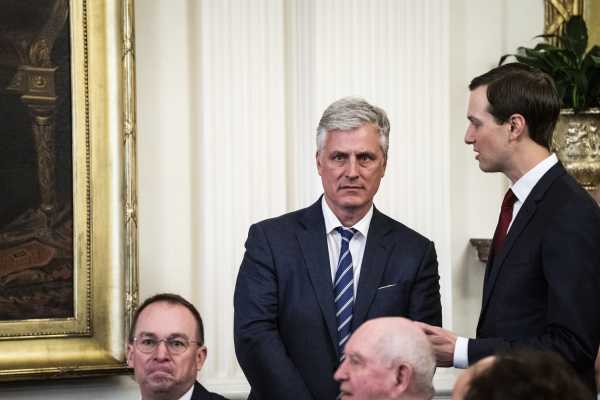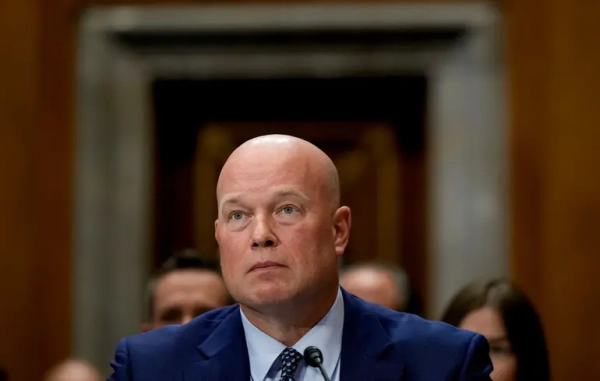
White House national security adviser Robert O’Brien categorically denied reports that Russia has been interfering in the 2020 election in support of President Donald Trump’s reelection campaign this weekend. And as he did so, O’Brien promoted reports that Russia is meddling in the 2020 Democratic primary on behalf of Sen. Bernie Sanders.
Last week, the New York Times reported that intelligence officials have determined that Russia has been working to support Trump’s reelection campaign. These officials reportedly warned the House Intelligence Committee, and briefed the president on their analysis as well. On Friday, the Washington Post revealed that Russia has also attempted to meddle in the Sanders campaign, and that Sanders, lawmakers, and President Trump were informed.
On ABC’s This Week on Sunday, O’Brien told host George Stephanopoulos that the Times and Post reports of warnings about Russia attempting to meddle on the president’s behalf are false.
“I haven’t seen any intelligence that Russia is doing anything to attempt to get President Trump reelected,” he said.
And on CBS’s Face the Nation, he told moderator Margaret Brennan that he had not seen the information used in the House briefing himself, but understood there to be “no intelligence” behind it. He also said there were only news reports about the briefings because information had been “leaked.”
“I get this secondhand, but from Republican congressmen that were in the committee, there was no intelligence behind [the report],” he said. “I haven’t seen any intelligence to support the reports that were leaked out of the House.”
When Stephanopoulos asked if he had asked to see any of those reports or information first-hand, O’Brien responded, “All I know is that the Republicans on the side of the House hearing were unhappy with the hearing and said that there was no intelligence to back up what was being said.”
The official went on to make a distinction between intelligence and analysis, arguing that what was presented to the House was analysis that he was not sure was backed up by intelligence, although he did not clarify what that analysis might have been based upon.
The national security adviser also faced questions about the sudden ouster of former acting director of national intelligence, Joseph Maguire. Trump reportedly berated Maguire about the House briefing before firing him, a move that Vox’s Alex Ward — and others — reported was “absolutely” related to the briefing.
“That’s not true,” O’Brien said of the reports on ABC. “I was in that meeting and the president was not angry with Joe Maguire.”
And he told CBS that “Maguire was always planning on leaving within the next couple of weeks.”
Again, this narrative would seem to contradict what journalists have reported. However, O’Brien did appear to endorse reports that found Sanders had been briefed on 2020 interference, in order to promote the idea that Sanders is the Kremlin’s preferred candidate.
“What I’ve heard from the FBI … is that Russia would like Bernie Sanders to win the Democratic nomination,” O’Brien said on CBS. “They’d probably like him to be president, understandably, because he wants to spend money on social programs and probably would have to take it out of the military, so that would make sense.”
The official did not elaborate on how the reporting on Sanders could be correct while the news on Trump was wrong, but his answers Sunday mirrored the narrative promoted by his boss last week in the wake of the reports.
A paradoxical spin that serves to muddy the waters
At a rally for supporters in Las Vegas on Friday, Trump acknowledged that he was in fact told “a week ago” about a Russian effort favoring him, although he framed the briefing as being told about his foes trying to start “rumors” about him.
But like O’Brien, he cast doubt on the analysis of the intelligence community, calling any suggestions Russia hoped to aid his campaign “disinformation.”
He also attacked the news reports on Twitter, calling them a hoax:
Sanders, who is also implicated in Russian attempts at election interference, took a decidedly different tack: he condemned all interference, as he has done in the past.
“I don’t care, frankly, who Putin wants to be president,” Sanders said in a statement to the Washington Post. “My message to Putin is clear: stay out of American elections, and as president I will make sure that you do.”
The Trump team is walking an altogether different line: admitting that interference is happening, but arguing it both is — as O’Brien did above — and is not necessarily happening to benefit anyone.
“I do think the Russians and the Chinese and others like to sow disruption in the American electorate,” O’Brien said on This Week. “And that doesn’t mean because they prefer a particular candidate. It’s because these are autocratic regimes that don’t believe in democracy and they’d like to see Americans at each other’s throat.”
Clarity around election interference is important because it is a specter that has hung over Trump’s presidency since before he was even sworn in. But it is also important that Americans understand how, and to what degree any foreign power is working to influence the outcome of the election ahead of voting, particularly given questions over interference could give anyone fertile ground to contest the outcome of American elections in general.
Given the fact the Trump administration has not hesitated to spin facts — such as the conclusions of the Mueller report — in the past makes it somewhat more difficult to take O’Brien at his word than it might otherwise be. But regardless of accuracy, O’Brien’s statements Sunday have served to only further muddy the waters around Russian interference, and to what degree that country is attempting to boost any candidate.
Sourse: vox.com






